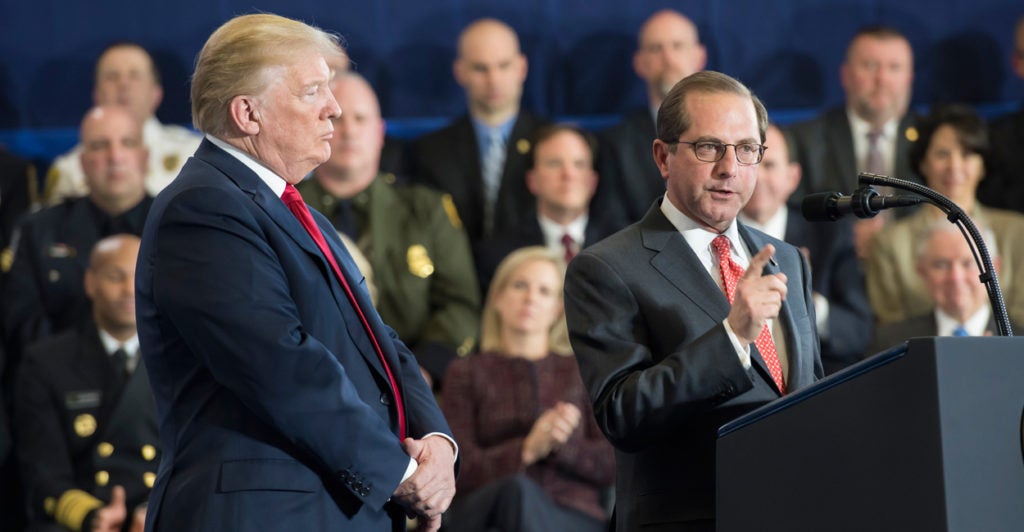Health and Human Services Secretary Alex Azar spoke to The Daily Signal’s Rob Bluey about the Trump administration’s response to the opioid crisis. Azar spoke Thursday at Generation Next, a White House forum for millennials. An edited transcript of his Daily Signal interview is below.
Rob Bluey: You were with President Trump earlier this week in New Hampshire talking about the opioid crisis. What did you see when you were on the ground there?
Alex Azar: What I got to see was the president really leading with this is a historic effort to try to tackle the opioid crisis. Laying out very clear goals for the first time and a very clear funded agenda against that.
I went with him to a fire hall where they are dealing with hundreds of opioid overdoses in a month compared to just a couple fires in a month. Isn’t it amazing that our firefighters are spending vastly more time dealing with opioid overdose than fires?
That’s a sign. There are 116 Americans dying every single day from this opioid crisis. It’s hitting every community in every generation.
Bluey: New Hampshire is a state that’s been hit hard and The Daily Signal has reported from that state on the crisis. How are you, as the secretary of Health and Human Services, and the Trump administration going about addressing it?
Azar: So the president laid out a three-part plan. The first is preventing people from getting addicted in the first place. The second is stopping the flow of illicit opioids in this country. And the third is compassionate treatment for people who have gotten addicted.
I’ve got a really big role on the first and the third as well as a helping hand on the second of those. So preventing—people don’t understand a lot about this opioid crisis and we’ve gotta help educate our population about that.
This defies some of your usual stereotypes around drug behavior. Most of the people who get addicted to opioids did not seek out a high, were not seeking to become addicted. They went to a doctor for pain. Or they had surgery, they had a wisdom tooth taken out. And a doctor handed them 90 legal opioid pills. And soon enough they became addicted for reasons we don’t fully understand. Some people simply become addicted.
And that starts them down a spiral of addiction where eventually they get cut off because the doctor, the insurance company, or the pharmacist says, “That’s enough. You’re addicted.”
And then they transition to these illegal opioids. Heroin, fentanyl, God help you, and then path of just the path to the bottom on this addiction. And so, so many people are really getting into this. Not because they wanted to be drug addicts or anything like that. And that’s why it’s very important that we recognize this is not a moral failing, it’s a medical issue.
Bluey: Well at today’s event, we’re here at the White House with millennials. It’s affecting college campuses, too. What is your message to them?
Azar: What I’m going to say is it’s hitting everyone. I’ll tell you, I was with a young lady a couple weeks ago in the Daytona area, a 17-year-old girl. Her sister has died from opioid overdose, her mother died of opioid overdose, father died of opioid overdose, put in with her grandmother, grandmother is an opioid addict, dies from complications from the overdose.
This young girl, 17, is an addict. She, thank God, is seven weeks clean and she’s hoping to graduate from high school.
She’s living in a group home. It’s in every single generation. That one family, three generations right there. My message to college students is certainly don’t be doing any drugs. There’s bottom line, do not be doing any drugs.
But there’s an extra reason to be extra careful here. Your drugs that you may be doing can be laced with fentanyl. The gangs are putting fentanyl in other products to help get you addicted to opioids and pull you down this path.
Be very careful. I have been with people who have lost loved ones, who were taking what they thought was a street version even of an antidepressant, laced with fentanyl. A young girl I was with also in the Dayton area.
Her best friend of her brother died because he was self-treating for depression, buying street versions of an antidepressant, and had fentanyl in it and killed him. Because it is so potent in such small quantities, it can be a death sentence.
Bluey: And finally, for our audience that’s watching, if they happen to be addicted or know somebody who is, where do they go for help?
Azar: You could go to hhs.gov/opioids. Right there, that’s an entry point. There’s access to resources right there. If you’re in a crisis situation, even go to the emergency room at your hospital. Just seek out that help.
We want to get you into medically assisted treatment, that means we help wean you off of the opioids that you’re on and then get you on their therapies, medical therapies, that we can use that can actually help you deal with this addiction as you transition from this addiction to what may be actually a physical dependence that you have on opioid because your body may have actually become dependent on that.
And that’s okay. We can work with you on that. So seek the treatment though.
